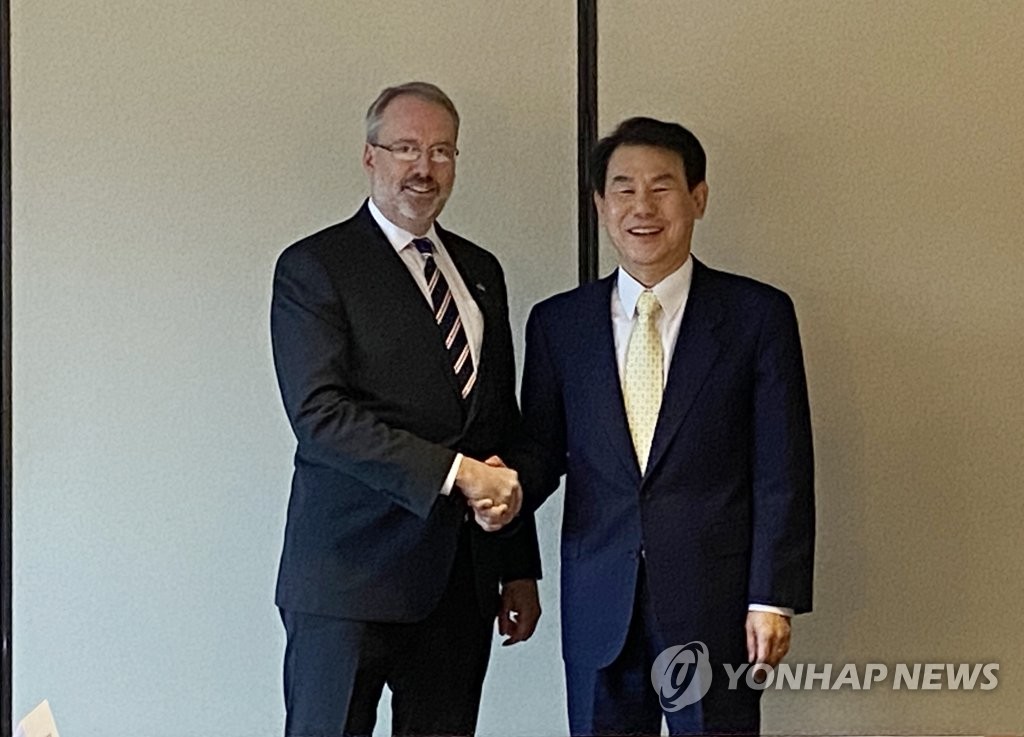- California Assembly OKs highest minimum wage in nation
- S. Korea unveils first graphic cigarette warnings
- US joins with South Korea, Japan in bid to deter North Korea
- LPGA golfer Chun In-gee finally back in action
- S. Korea won’t be top seed in final World Cup qualification round
- US men’s soccer misses 2nd straight Olympics
- US back on track in qualifying with 4-0 win over Guatemala
- High-intensity workout injuries spawn cottage industry
- CDC expands range of Zika mosquitoes into parts of Northeast
- Who knew? ‘The Walking Dead’ is helping families connect
S. Korea, U.S. wrap up defense cost talks without breakthrough
Differences still remain between South Korea and the United States over how to share the cost of stationing American troops in Korea, the foreign ministry said Thursday, after wrapping up the latest round of negotiations in Washington.
The two teams, led by Jeong Eun-bo on the South Korean side and James DeHart on the U.S. side, held their sixth round of talks on Tuesday and Wednesday (U.S. time) to renew the countries’ Special Measures Agreement (SMA). The previous SMA expired at the end of last year.
“The two sides broadened their mutual understanding and consensus, but confirmed that there are still differences between them,” the foreign ministry said in a statement Thursday without elaborating on what those differences are.
During the talks, the South stuck to its existing position that negotiations should be conducted within the framework of the current agreement and that a “reasonable and equitable” deal should be reached, the ministry said.
The two sides agreed to work together to conclude negotiations at an early date, it said.
The allies have shown disagreement over determining Seoul’s payment for maintaining some 28,500 U.S. soldiers on its soil. Washington has demanded a significant increase in the financial contributions and creation of additional categories for Seoul to shoulder the cost for rotational troop deployments to the peninsula.
Under last year’s SMA, Seoul was required to pay some US$870 million.
Later in the day, the foreign ministry said that South Korea’s possible troop deployment to the Strait of Hormuz didn’t come up during the defense cost talks, rejecting speculation the issue could be used as a bargaining chip amid Washington’s calls for allies to join its initiative to protect the key waterway.
“There were no discussions in relation to the Hormuz during the SMA negotiations,” ministry spokesperson Kim In-chul told a press briefing when asked about the possible troop dispatch.
What and how Seoul can contribute to the U.S. request apparently topped the agenda during the bilateral meeting between Foreign Minister Kang Kyung-wha and Secretary of State Mike Pompeo near San Francisco on Tuesday.
The top U.S. diplomat called for collective efforts by the international community to safeguard the region, a Seoul official said after the meeting, suggesting that Washington wants commitments from Seoul.
South Korea has yet to make a decision on whether to contribute, considering its trade relations with Iran.
“Over the negotiation process, our side has said that our contribution to the alliance through indirect or direct support, besides the SMA, should be fairly assessed,” Kim added.
Jeong made a similar comment that he has been emphasizing to the U.S. side that the South has made big contributions to the alliance, including arms purchases from Washington.
Arriving in Washington on Monday, Jeong told reporters that the two sides are narrowing their differences but remain apart on how to reach a “comprehensive” deal.
U.S. President Donald Trump has branded South Korea a rich country that should pay more for its defense. In a media interview over the weekend, he claimed, “They’re going to pay us a lot more.”

This photo, provided by South Korea’s foreign ministry, shows Jeong Eun-bo (R), Seoul’s chief negotiator, shaking hands with his U.S. counterpart, James DeHart, during their sixth round of talks in Washington on Jan. 14, 2020. (Yonhap)











